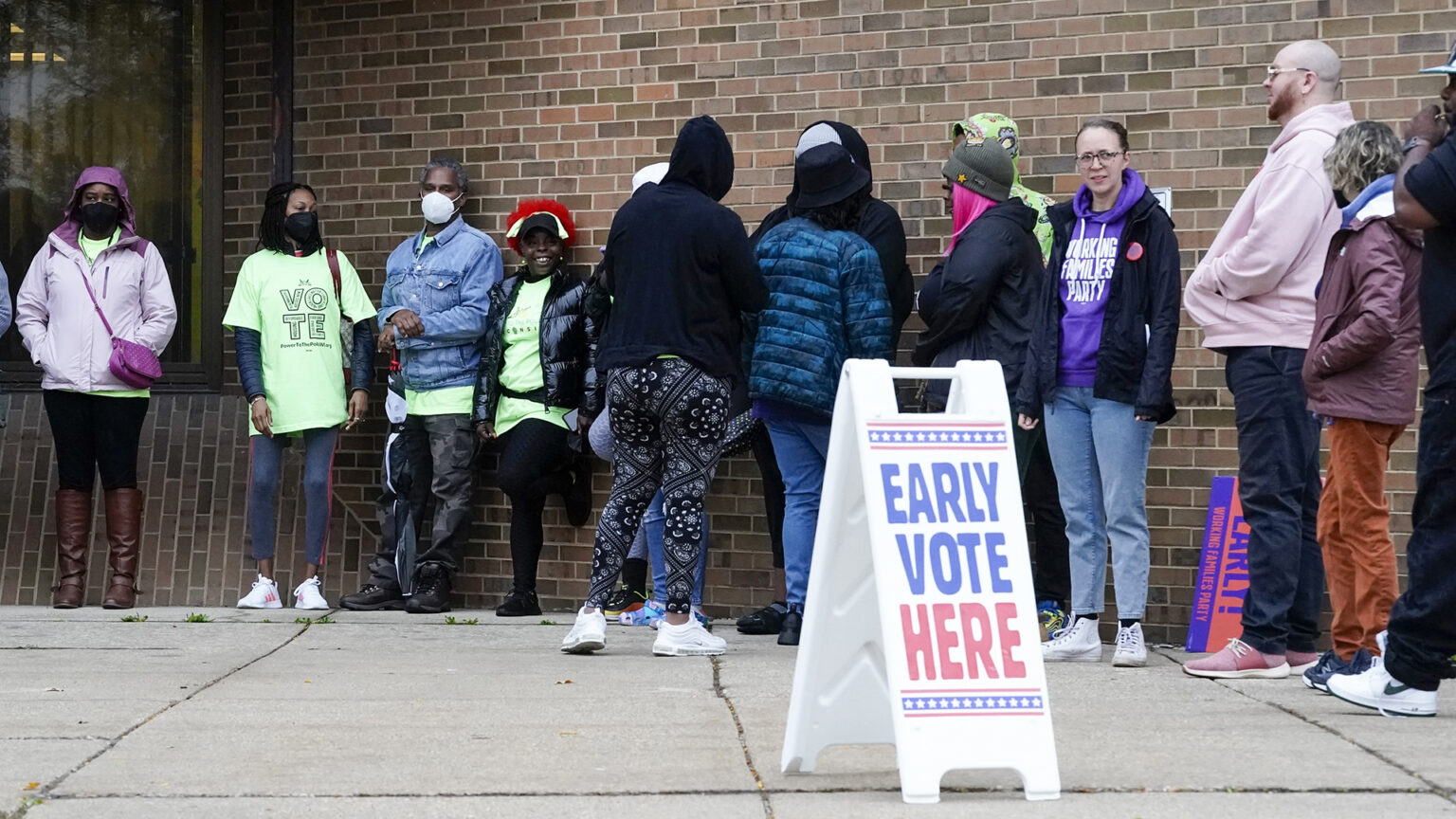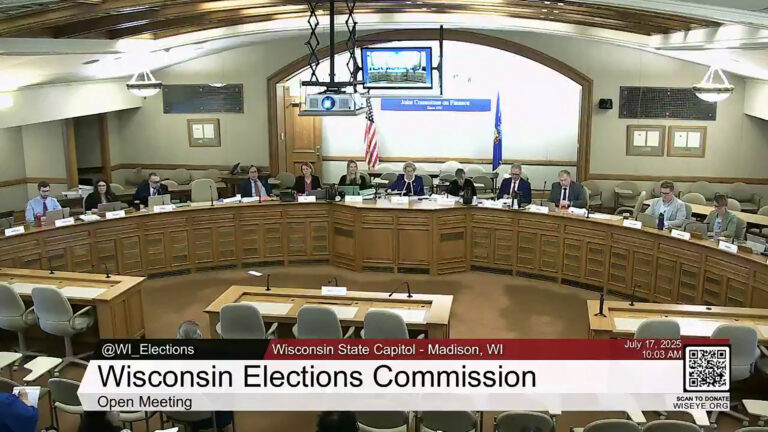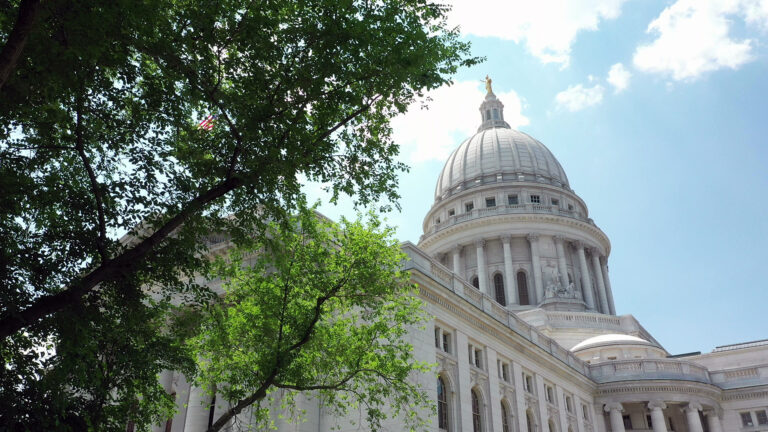Wisconsin appeals court won't block ballot spoiling ban
A state appeals court on Oct. 27 decided against hearing an appeal of a Waukesha County circuit court judge's ruling in favor of a conservative group founded by prominent Republicans.
Associated Press
October 28, 2022

People line up outside a polling station to cast their votes in Milwaukee on Oct. 25, 2022, which marked the first day to vote early in Wisconsin. (Credit: AP Photo / Morry Gash)

MADISON, Wis. (AP) — A Wisconsin appeals court is refusing to block a lower court’s ruling prohibiting voters who already submitted an absentee ballot from voiding it and voting again, a rarely used practice known as ballot spoiling.
The 2nd District Court of Appeals decided Oct. 27 against hearing an appeal of a Waukesha County circuit court judge’s ruling on Oct. 6 in favor of a conservative group founded by prominent Republicans.
The elections commission held an emergency meeting on Oct. 28, less than two weeks before the Nov. 8 election, and unanimously voted to rescind the guidance issued in August detailing how an already cast ballot could be spoiled.
Very few voters have actually spoiled their absentee ballots after voting in recent elections, data provided by the elections commission to The Associated Press shows.
In the August primary, just 3,519 people cast a new ballot after spoiling their original one, less than 0.3% of all votes cast, the data shows.
In the 2020 presidential election, nearly 33,000 voters spoiled their ballots and cast new ones, nearly 1% of all votes. In that election, President Joe Biden defeated former President Donald Trump by 20,682 votes.
In the 2018 midterm election, 369 ballots were spoiled and recast, just .01% of all ballots.
There’s no way to know how many of the spoiled ballots were from Democrats or Republicans since voters in Wisconsin do not register by party.
Wisconsin voters have been submitting absentee ballots by mail for weeks and in person starting Oct. 25. As of Oct. 28, more than 397,000 ballots had been cast either by mail or in person, according to the elections commission.
Democratic Gov. Tony Evers and Republican U.S. Sen. Ron Johnson are both on the ballot in tight races. Johnson’s race could determine which party has majority control of the Senate and the next governor will be in position to either enact or reject bills passed by the Republican-controlled Legislature heading into the 2024 presidential election.
The appeals court on Oct. 10 agreed to put the lower court’s ruling on hold while it decided whether to hear the appeal from the elections commission, the Democratic National Committee and Rise, Inc., a group that works to get college students to vote.
“The court’s order does not change what is on the ballot. Nor does it prevent a single voter— Democrat, Republican, or otherwise — from casting a ballot in the upcoming election,” the appeals court said. “Thus, claims of confusion and disenfranchisement ring hollow.”
The appeals court’s ruling lifted that hold as of 3 p.m. on Oct. 28, leading to the emergency elections commission meeting.
The order from Waukesha County Circuit Judge Brad Schimel, a former Republican attorney general, required the elections commission to inform municipal clerks and local election officials that its guidance on ballot spoiling issued Aug. 1 had been withdrawn. Schimel also forbid the commission from issuing any future guidance related to ballot spoiling that is not allowed under the law.
Restoring Integrity and Trust in Elections filed the lawsuit in September. The group was created in July by former U.S. Attorney General William Barr, longtime Republican strategist Karl Rove, GOP donor Steve Wynn and others. It has also filed election-related lawsuits in the battleground states of Arizona and Pennsylvania.
Ballot spoiling got more attention in Wisconsin during the August primary after a Republican candidate for governor and three top Democratic candidates for U.S. Senate dropped out of the races, but their names were still on the ballots. The elections commission made clear then that voters who had cast their ballots for one of them absentee could spoil it and vote again for someone still in the race.
RITE argued that the practice in Wisconsin is both against the law and creates additional opportunities for fraud and confusion. The appeals court noted that state law does allow for a clerk to issue a new ballot if a voter returns a “spoiled or damaged absentee ballot.” But the law does not appear to authorize a clerk to spoil a ballot that’s already been cast and issue a new one, the appeals court said.
Editor’s note: This story has been corrected to show that the number of absentee ballots cast as of Oct. 28 was over 397,000.
Associated Press writer Harm Venhuizen contributed to this report.
 Passport
Passport











Follow Us